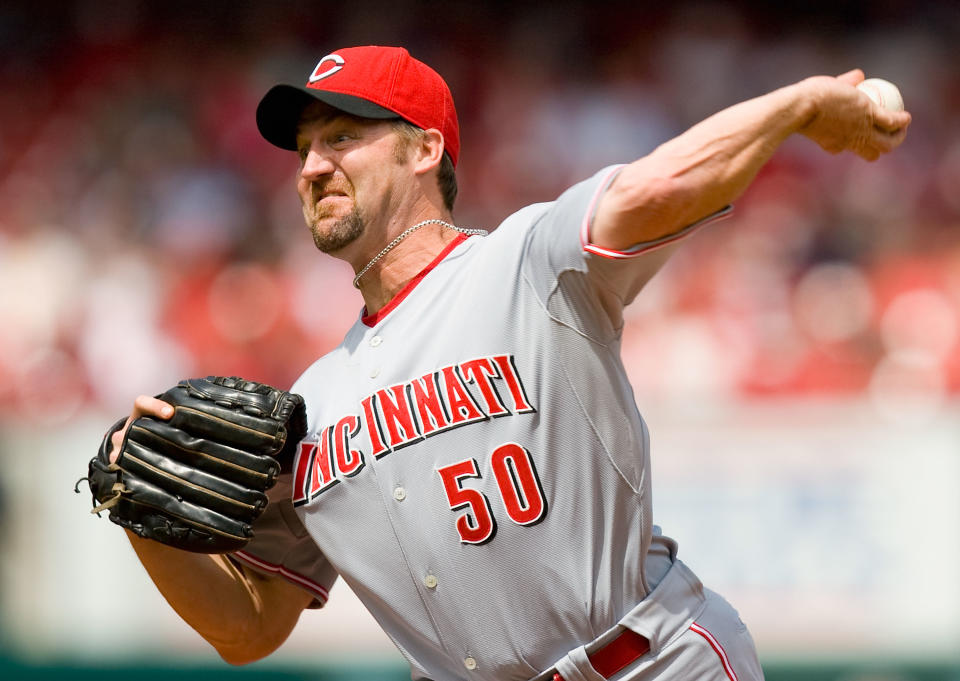Danny Farquhar's long and difficult road as he recovers from a ruptured brain aneurysm
The long, difficult journey back – back to his wife, back to his three children, maybe even back to a baseball diamond – is just starting for pitcher Danny Farquhar. It’s been less than two weeks since a blood vessel in his head burst and flooded his brain with blood moments after he finished an inning for the Chicago White Sox. Cerebral aneurysms kill 40 percent of those who suffer them. More than half who survive live with disabilities. Success, especially in the early stages, is measured in small increments. A step here. A word there. A sign of improvement.
“He has been progressing every day,” Sohail Shahpar, Farquhar’s longtime agent, told Yahoo Sports on Thursday. “And the outlook is positive in terms of his overall recovery.”
Around baseball, friends and those who have crossed paths with the 31-year-old agree: It’s virtually impossible to bet against Danny Farquhar. One need know nothing more than a pair of measurables to understand why: the hand with which he throws (right) and the height he stands (69 inches). In the last half century, only 16 righties 5-foot-9 and shorter have managed to last even 10 appearances in Major League Baseball. Farquhar is seven seasons and more than 250 appearances deep.
So, yes, they believe he will recover because what other choice is there, really? An estimated 6 million people live with aneurysms in their brains, just waiting to rupture, and it happens in 30,000 each year. Which means Farquhar could spend his time wondering why him, or he could do what he has done throughout his career and wonder: Why not him?
“It’s not out of the question to be speaking about it,” Shahpar said. “It’s too early to really tell in terms of the longer-term effects, if any. And then there’s also the difference between whether he can physically get on the mound and throw a baseball versus being a major league pitcher again.”
Time will judge that, and yet as it ticks, Farquhar can look back almost two decades and see hope. Kent Mercker was 32 years old when blood infiltrated his brain. Doctors still aren’t entirely certain what caused the hemorrhage. Mercker was on the mound in Anaheim, pitching for the Angels against the Rangers. He threw a pitch in the second inning.
“I got a weird sensation in my head, like my ears were popping,” he said by phone Thursday. “It was muffled hearing, sort of like what happens on an airplane.”

The trainer came out. Mercker figured he was fine. He threw four more pitches. Then, he said, “It felt like someone hit me in the back of the head with a fungo.” He dropped to a knee. Walking off the field, he couldn’t turn his head or his neck. He didn’t make it into the trainer’s room before he started throwing up. Dr. Lewis Yocum, the Angels’ longtime team doctor and a renowned orthopedic surgeon, looked at Mercker and told team personnel to get him to the nearest hospital as soon as possible.
The bleeding on his brain resolved itself quickly. Mercker’s case wasn’t nearly as severe as Farquhar’s, who required surgery. Even so, after 12 days in the hospital, the first doctor Mercker saw told him his career was over. He wasn’t in a place to say otherwise, so he went home for a few weeks. Mercker felt fine. He went for a second opinion, and that doctor told him to go play. Three months, one day after his brain bled, he was back pitching against the New York Yankees. And while Mercker does admit he returned too quickly – he was bad enough in 2000 that he didn’t pitch in 2001 – his career picked back up in 2002 and continued through 2008.
“If I have any advice for him, it’s that once you’re OK’d by the medical staff, don’t worry about this happening again,” said Mercker, an agent with Excel Sports Management these days. “Don’t play 50 percent or 10 percent. Don’t give it any less on the field because you worry this may happen again. Don’t let this affect how you try to perform and prepare and work out.
“I never thought twice about it. I’ve been hit with line drives that I’ve gone out the next time and thought I don’t want to get hit again. With this, I was assured by the doctors – and trust me, the stress test I had to go through for liability reasons, I had to go through a bunch of stuff before they’d let me step foot on the mound.”

About a year after Mercker’s hemorrhage, an old friend was in a hotel room in Oakland when his headache started. His pain threshold was steep, yet this was unlike anything he ever felt. He called his wife, eight months pregnant at the time, and she urged him to call the front desk. When he was being gurneyed into the ambulance, Rex Hudler said, a child with Down syndrome poked his head into the back of the ambulance and said: “He’s gonna be all right!”
And Hudler, the longtime big league utilityman who then was an Anaheim Angels broadcaster and today does color commentary on Kansas City Royals games, believed he would be just fine. This was a sign, he said. His son Cade, 4 years old at the time, has Down syndrome, too. If he lived through this, Hudler promised himself, he would do everything he could to live an even richer life than he already had.
His headache raged through the night. Angels doctors suggested he be moved to a hospital at Stanford. When the helicopter pilots showed up, Hudler being Hudler, he asked if they could give him a fly-by of Oakland Coliseum. They laughed, avoided the detour, took him to the hospital, got him the pain meds he needed and found that, as with Mercker, the brain bleed had resolved itself.
“Anybody that can survive blood on the brain in any form is a miracle,” Hudler said Thursday. “After that, the flowers never looked better. The fragrances – every time I’m in nature, it’s amazing how it pops. When people ask me, I tell them, ‘Fortunately, I had a brain hemorrhage.’ What it did for me was amazing for the growth of my humanity, my spirit.”
Hudler took six weeks off. He received countless well wishes, including a hand-written letter in English from a rookie outfielder named Ichiro Suzuki, who as a 19-year-old had watched Hudler win a Nippon Professional Baseball championship with the Yakult Swallows. And now, all these years later, he sees Danny Farquhar, sees what lies ahead, and sees nothing but possibilities.
“If he can’t play baseball anymore, that’s a small thing. Life is too great,” Hudler said. “But if he can, it would be a huge inspiration for others.”
Time will tell. For now, Farquhar has nothing but small increments – steps here, words there, signs of improvement. He survived something that so many don’t. And as long and as difficult as the days to come may be, Hudler is right. Return or not, that Danny Farquhar is still here, still fighting, is miraculous enough.
More from Yahoo Sports:
• Falcons sign QB Ryan to jaw-dropping extension
• Steelers make classy $8M gesture to Shazier
• ‘Weird’ playoff schedule bothering LeBron
• Ichiro’s 2018 season over, will move to front-office role



